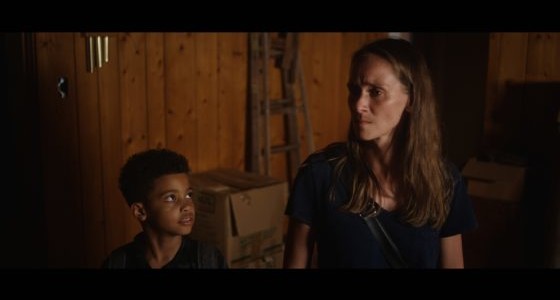While not true in all cases, victims of childhood abuse can, in many situations, grow up to harm their own kids. Too many people raised in abusive homes fear someday they will also turn to violence, which either prevents them from having kids altogether or stops them from developing meaningful relationships with the children they do have. In either situation the cycle of violence continues because these adults struggle with their past and find it hard to fully escape the mistreatment they received. In Patrick Rea’s film, we see a woman escape violence only to meet up with more brutality, which causes her to eventually return to her painful origins. Making its world premiere at Popcorn Frights, THEY WAIT IN THE DARK shows how violence begets violence and just how difficult it can be to stop generational abuse.
Amy (Sarah McGuire) and her son Adrian (Patrick McGee) sleep on the floor of a convenience store and meagerly dole out their remaining bills as they try to find a safe place to stay. As a mother, Amy does the best she can to hide the dangers of the world from her young boy and tries to keep a cheerful outlook and hopeful disposition. We do not realize at first their wayward journey holds a specific destination in mind, but once we meet childhood friend Jenny (Paige Maria) the story becomes clear. Amy and son recently inherited her late-father’s run-down property, and she plans to return to her old home. With that, we quickly learn what the main characters are running to, but what are they running from? That requires a much more complicated answer.
Through a series of flashbacks and partial conversations with her friend, we learn Amy came from an abusive upbringing. We see Amy grimace and flinch as she recalls beatings from her mother, crying over her dinner, and threatening gestures with a hot curling iron. Once more in the same home as all those memories, Amy becomes easily triggered; each room holds a different traumatic story. Unfortunately, Amy’s escaping her horrible mother did not end the beatings. While catching up with Jenny, Amy reveals she is once again on the run from a violent home. Intersecting Amy’s story and flashbacks, we see scenes of a determined woman who seems always just two steps behind the mother and son. Amy reveals over drinks that she and her ex-partner Judith (Laurie Catherine Winkel) adopted Adrian together, but the purportedly happy family was anything but. So, in an attempt to protect her son from a childhood similar to her own, she kidnaps Adrian and runs away.
Rea presents an accurate depiction of child abuse both in the scripted actions, and in how the memories play across Amy’s face. How quickly any previously forgotten thoughts rob the grown woman of sleep, of her mental health, and of any peace. She hides thoughts from her son and hopes keeping him ignorant about both their abusive mothers will allow him to grow up normal. However, being birthed into a house filled with hostility makes it difficult to outgrow the violence. Along with very real terrors, Rea includes a supernatural aspect which haunts Amy’s house. The spirits speak to Adrian, which scares him, but their real power gets unleashed upon Amy. The violence of the home manifests as these monsters; they represent all the fear and torment Amy experienced as a child. Returned to the source of her trauma, she finds it harder to control her emotions and actions and worries she might pose a danger to her son.
While he executes the core theme very well, Rea tries to pack too many topics into one film, so the other themes lack substance. He excels at creating believable instances of child abuse and the lingering trauma, but the queer story line needed more development. I appreciate the attempt to explore the lesser discussed topic of abusive homosexual relationships, but the characters lacked nuances and I am worried their terrible choices connected to their child will come off as a homophobic portrayal of a same-sex couple instead of the reflection of the vicious cycle of child abuse that it is. Both McGuire and Winkel do well fleshing out the complexities of their characters, but the story takes a bit too long to get us to the point where we fully understand these women. So, for the first half of the film they read more as domestic abuse stereotypes. McGuire definitely offers strong leading moments as she fights her demons, but the more the film tries to combine all its heavy concepts, the more subdued the character of Amy becomes.
THEY WAIT IN THE DARK displays powerful images of childhood abuse which will spark painful memories for some. The title itself lets us know “They” lurk in every part of our lives, and “They” can strike at any time. In this case, “They” refers to the memories and violence which exists in anyone who experienced abuse. A person’s past, whether in their minds or carved into their bodies, never fully leaves them and at any moment the buried traumas can appear and take over a normally gentle person. Or, perhaps, the violence forever altered them, and the gentleness is merely a façade.
Tags: Film Festivals, Haunted House, Laurie Catherine Winkel, LGBTQ+ Horror, LGBTQIA+ horror, Paige Maria, Patrick McGee, Patrick Rea, Popcorn Frights, Popcorn Frights 2022, Queer Horror, Sarah McGuire, They Wait In the Dark



No Comments